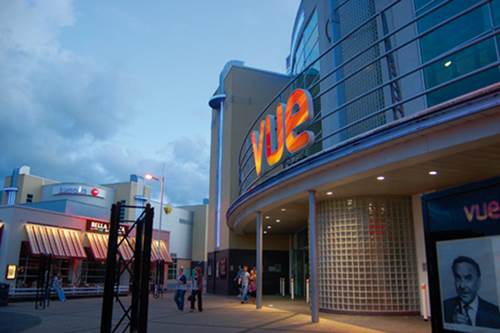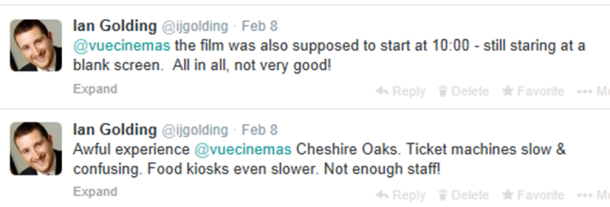Regular readers of my blog know that I often write about experiences of my own. I am a huge believer in using story telling as a way of bringing to life the principles of customer experience. Stories help explain what the theory really means, and are an extremely effective way of educating and influencing friends, colleagues and bosses alike. This post will be adding to my library of stories.
If you live in the UK, you will be painfully aware of the rather bad weather we are currently experiencing. I actually count myself lucky living in the North West – we have got off relatively lightly compared to people living in the South of England. One of the challenges for families with young children is finding things to do at the weekend when the weather is bad. Whilst the Golding’s are not averse to walking in the rain, we do like to try to find alternative activities in the dry. Every now and then, I make the decision to take the children to the cinema. They see it as a lovely treat, whilst it is an easy, relaxing option for Mums and Dads.
Last weekend, I decided to take my three to the Cinema – Vue at Cheshire Oaks. I did not think the experience would result in me writing a blog post! It has been quite a while since I last went to the cinema, and I was mildly excited at the prospect of sitting in a comfy seat for two hours with my three little people. Vue at Cheshire Oaks show one film at the weekend at a vastly reduced price to normal. Whilst the film may be slightly random, it does make a trip to the cinema much better value. On Saturday, I paid £1.75 each for us to see ‘Free Birds’ – an animated film that sees Turkeys going back in a time machine to stop Turkeys being used as the main course for Thanksgiving – I told you the choice is often a little random!!

So now you know the background, let me explain why I have felt the need to write about it. A trip to the cinema in 2014 is no longer a low-cost entertainment experience. On a normal visit for a family of five, you could find yourself spending in excess of £70 by the time you have added drinks and snacks to the cost of your tickets. On Saturday, I spent £25 in total to take the children to see a film about Turkeys – a reasonable amount of money in anyone’s book. I do not begrudge spending the money. However, if I am making the decision to part with my hard-earned cash, I expect the experience to be worthy of the expense – and that was not the case for me on Saturday.
My decision to go to the cinema was a last minute one – I did not have the chance to pre-order tickets online. I therefore needed to buy tickets on arrival. On entering the cinema, I was greeted by a number of self-service machines, and a counter that was unmanned. If you wanted to buy tickets, it appeared as though you had no option but to ‘do it yourself’. Normally I would not mind this – if the machines were intuitive, simple and easy to use. I did not think they were any of these things – especially if you had not used them before. It took me a while to figure out what I was supposed to do – much to the irritation of the customers behind me who did nothing to hide their frustration. If there had been a member of staff on hand to help, things might have been a little easier.
So I was now slightly flustered, and had only just gone through the ticket buying process. Next up – drinks and snacks. As we walked in to the main foyer, we were met by five equally long queues – all lined up waiting to buy food. I did not expect to see such long queues at 09:45 on a Saturday morning. It took us 15 minutes to get to the front of the line – 15 minutes!!!!! It was very clear that there were just not enough staff to cope with the number of customers. I was amazed at how calm the customers were – maybe regular cinema goers have come to expect this level of service – to me it is completely unacceptable.
The film was scheduled to start at 10:00 – due to the length of time it took us to purchase food, the children were worried they had missed the start. We entered the screen at 10:10 – we needn’t have worried. As we walked in, the screen was blank. It remained that way until 10:25 – I hate to think how long the early customers had been staring into the abyss for. There was no explanation, no apology. When the film finally did start, I was relieved more than anything. Fortunately, the film was actually very funny – the kids loved it, and we left with smiles on our faces.
However (there is usually one of those), I felt it important to express my dissatisfaction about our experience with Vue – if you do not tell a company when you have experienced something unsatisfactory, how can you expect them to do anything about it? So I sent Vue the following Tweets whilst I was waiting for the film to start:

I did not get an immediate response. In fact it was not until later that day that I received a response from Vue – this was what they said:

And that is what has infuriated me more than the experience itself. What Vue are telling me is that my poor experience is not their fault. They are almost telling me, the customer, that it was my fault for visiting their cinema when it was busy. ‘If you want a better experience, come when it is quieter’!! ‘Staff try and work as efficiently as possible’ – this is not the fault of staff – there were quite simply just not enough of them!! What Vue have done is provide an excuse; a justification; a defence; as to why the customer experience may sometimes not be up to scratch. There was no hint of an apology – just a thanks for telling them what it appears they already know. I am fortunate to have spent only £1.75 for the privilege of the experience – what about customers who had spent £9 and upwards?
Providing excuses, justifications and defences of poor customer experiences are all cardinal sins of customer experience management. If an organisation is genuine in its desire to capture customer feedback, and act on it, it must acknowledge that there are real reasons for customers to have negative perceptions. Instead of dismissing those perceptions, they must be embraced and investigated. If Vue know that they have ‘peaks and troughs, throughout the day, they should plan workloads to address them accordingly. They cannot blame their customers!
A visit to the cinema is an expensive activity that deserves the experience to match the price tag. I will think twice before visiting Vue again – I certainly will be unlikely to pay ‘full price’ – especially when the company that delivers the end to end experience appear to think so little of their customers. If I were them, I would stop making excuses and start listening.




Ian: When things don’t go right service-wise, I, too, am prone to complaining. I do this for two reasons. First, when I know that I’m smugly in the right, and haven’t contributed to bringing the problem on myself in some way, it actually feels good to complain. Second, and more importantly, when the error is especially egregious, I often feel compelled to help out a business that has clearly lost its way with customers. I do this without charging them, though I always remind the hapless soul tasked with enduring my tirade that my billable rate is a very high number.
I agree with your point about excuses. If I could make one recommendation to companies, it’s to not have employees waste their breath on explaining to customers about their [antiquated technology, training problems, inability to respond to previous complaints, ineffective management, outdated and ossified policies, staff absences, or the worst, saying ‘oh, you’re the only I’ve ever heard complain about that’ . . . the list goes on.]
Instead, if a vendor really wanted to do something valuable it would be to follow up the next day to thank the customer for making them aware of the problem, and then in one week, share back what they did to address the problem – even if it’s nothing more than to inform the customer that the service problem was discussed in a staff meeting and there were several employees who aired valuable ideas for fixing it “thank you once again for taking the time to let us know . . . ” I would be ecstatic, and would probably tell 10 people how ‘customer-centric’ the company is.
There is one situation when I think it’s appropriate for companies to firmly explain to complaining customers why they do (or did) something a certain way. In some cases, a company must comply with regulations or stay on the correct ethical side of the fence, and in doing so, their actions might come across to customers as inconvenient, wrong, or uncaring. In those cases, it’s important for the vendor to explain the reason why a customer service agent handled a problem in a particular way. When this is done with sincerity and consideration, it would take a hard-hearted customer not to accept the explanation.
Many thanks for taking the time to read and respond so eloquently Andrew. I have now had a response from Vue – it categorically fails to do anything you so rightly suggest. They did offer me free cinema tickets as a gesture of goodwill though!! I have politely declined, suggesting that a far greater gesture would be for them to get back to me in a few days having decided what they are going to do to address the issues and ensure that no-one ends up writing a negative blog about them in the future!! Let’s see if that actually happens…